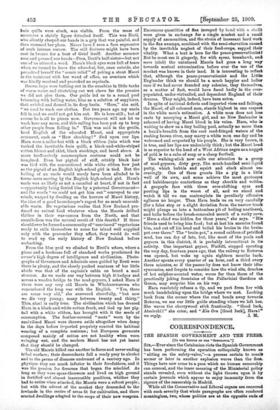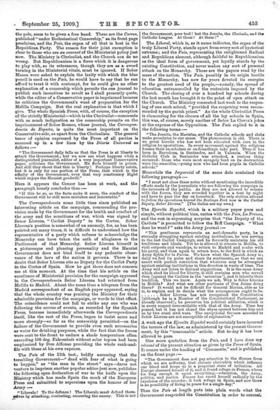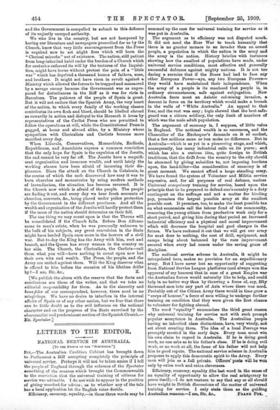CORRESPONDENCE.
THE SPANISH GOVERNMENT AND THE PRESS. [To THE EDITOR or mu "Erscusoz.1 Sin,—Ever since the Catalonian riots the Spanish Government has been performing the operation colloquially known as "sitting on the safety-valve,"—a process certain to result sooner or later in another explosion -worse than the first. Things have now come to a pass which no human censorship can conceal, and the inner meaning of the Ministerial policy stands revealed, even without the light thrown upon it by certain journals which appear to enjoy immunity from the rigours of the censorship in Madrid.
While all the Conservative and.Liberal organs are censored with such severity that whole paragraphs are often rendered meaningless, two, whose politics are at the opposite ends of
the pole, seem to be given a free hand. These are the Correo, published" under Ecclesiastical Censorship," as its front page proclaims, and the Pais, the organ of all that is best in the Republican Party. The reason for their joint exemption is clear to those who are au courant of the Ministerial policy just now. The Ministry is Clericalist, and the Church can do no wrong. But Republicanism is a force which it is dangerous to play with, so its utterances, though they are as a sword turning in the Ministerial vitals, must be ignored. If Senor Maura were asked to explain the laxity with which the blue pencil is used on the Pais, he would have to say that he can afford to treat it with contempt, for he could give no other explqns don of a censorship which permits the one journal to publish such incentives to revolt as I shall presently quote, while the editor of a Conservative paper is imprisoned because he criticises the Government's want of preparation for the Melilla Campaign. But the real explanation is that which I give. The whole Spanish Press, with, of course, the exception
of the strictly Ministerial—which is the Clericalist—comments with as much indignation as the censorship permits on the imprisonment of Senor Romeo, whose journal, the Correspon- dencia de Espana, is quite the most important on the Conservative side, as apart from the Clericalists. The general
tenor of opinion expressed by the Press of all parties is summed up in a few lines by the Diario Universal as follows :—
"The Government daily tells us that the Press is at liberty to attack the Government ; but we now see what happens when a distinguished journalist, editor of a very important Conservative paper, criticises the Government. He finds himself in prison. And still they shout that this is liberty ! Perhaps liberty exists, but it is only for one portion of the Press, that which is the affinity of the Government, even that very reactionary Eight which enjoys the Maurist goodwill."
Here it appears the Censor has been at work, and the paragraph lamely concludes thus
"If this be so, as the facts make it seem, the conduct of the Government will be still more mistaken and lamentable."
The Correspondencia some little time since published an interesting article on the campaign, commending the pro-
vision made by the Government for the health and comfort of the army and the munitions of war, which was signed by Senor Llorens, "Carlist Deputy" to the Cortes. Seiior Llorens's position is somewhat of an anomaly, for, as has been
pointed out many times, it is difficult to understand how the representative of a party which refuses to acknowledge the Monarchy can have taken the oath of allegiance to the Parliament of that Monarchy. Seiler Llorens himself is a picturesque and pleasing personality and the Maurist Government does not bind itself to any pedantic obser- vance of the laws of the nation it governs. There is no doubt that Seiior Llorens sits as Deputy for the Carlist Party in the Cortes of Spain. How he got there does not concern me at this moment. At the time that his article on the
excellence of Ministerial provision for the campaign appeared in the Correspondencia Seilor Llorens had returned from Melilla to Madrid. About the same time a telegram from the Madrid correspondent of an English paper appeared, saying that the whole country was praising the Ministry for their admirable provision for the campaign, or words to that effect.
The coincidence could not fail to strike any one who was following the course of events, as recorded by the Spanish Press, because immediately afterwards the Correspondencia itself, like the rest of the Press, began to insist more and more strongly—so far as the censorship permitted—on the failure of the Government to provide even such necessaries as water for drinking purposes, while the fact that the forces were sent to the front to endure a shade temperature often exceeding 100 deg. Fahrenheit without solar tepees had been emphasised by Don Alfonso providing the whole rank-and- file with these at his own expense.
The Pals of the 11th inst., boldly assuming that the trembling Government—" dead with fear of what is going to happen," as "the man in the street" says—dares not venture to imprison another popular editor just now, publishes the following open declaration of war to the knife upon the Ministry which has made. Spain the mock of the European Press and submitted to aspersions upon the honour of her Army
"Liberals ! To the defence ! The Liberals must defend them- wives by attacking, combating, censuring the enemy. This is not
the Government, poor tool ! but the Jesuits, the Clericals, and the Catholic League. At them I At them !"
The Liberal, which is, as it name indicates, the organ of the truly Liberal Party, stands apart from every sort of hysterical extreme ; and the Pais, representing the enlightened Radical and Republican element, although faithful to Republicanism as the ideal form of government, yet loyally stands by the existing Constitution, and never makes any sort of personal attack on the Monarchy. These are the papers read by the mass of the nation. The Pais, possibly in its origin hostile to the Monarchy, has now for years devoted its energies to the greatest need of the people,—namely, the spread of education untrammelled by the restraints imposed by the Church. The closing of over a hundred lay schools during the last month has brought it to the point of open attack on the Church. The Ministry consented last week to the reopen- ing of one such school, " provided the reopening were recom- mended by the parish priest." As the whole Clericalist Press is clamouring for the closure of all the lay schools in Spain, this was, of course, merely another of Seiior La Cierva's jokes at the expense of the Opposition. The Pais replied to it in the following terms :- "The Jesuits, the Maristas, and the Catholic schools and clubs make proselytes to our cause. The phenomenon is old. There is no great heretic who has not been educated with care in the religion he apostatises. In every movement against the religious houses their ex-scholars or ex-foundlings take part. Thus it has been in Barcelona, in Santander, and in Valencia. When the Catholic Club in Santander was attacked, a curious thing occurred: those who were most savagely bent on its destruction were the amarilios,—young men who had been pupils in Catholic' schools."
Meanwhile the Impartial of the same date contained the following paragraph :— "I must not close these notes without mentioni a the incredible efforts made by the journalists who are following the campaign in the interests of the public. As they are not allowed to remain with the forces, they are crowded together in a tent by night and have to pass the day on horseback. The only civilian allowed to follow the operations beyond the Restinga Fort now is the Carlist Deputy, Sefior Llorens." (The italics are my own.)
The Ejercito Espanol, which is a. military paper pure and simple, without political bias, unites with the Pais, La Prensa, and the rest in expressing surprise that "the Deputy of the Carlists " is permitted to follow the Riff Campaign. " What does he want ? " asks the Army journal :—
" This gentleman represents an anti-dynastic party, he is eternally struggling against existing institutions, he was serving in the last Carlist Campaign, and he fervently maintains his old traditions and ideals. Yet he is allowed to remain in Melilla, to visit outposts and warships, to return to Madrid and confer with his party, and then again to return here, to the field in which an Army fights for in Patria. We know what the Spanish Army is; daily we feel its pulse and share its sentiments, so that we can assert with perfect conviction that whatever may be attempted against existing institutions in this direction is waste of time. The Army will not listen to disloyal suggestions. It is the same Army which shed its blood for liberty, it still contains men who served then [against the Carlists in the 'seventies'], and it inherits their tradition. This we know. Again we ask, Why is Senor Llorens in Melilla P And what are other partisans of Don Jaime doing there ? It would not be difficult for General Marina, able as he is, to explain and to decide what the consequences ought to be.
Senor Llorens has not recognised the Constitution [although he is a Member of the Constitutional Parliament, as already observed] ; he preserves his political affiliation, which is in every respect irreconcilable with that of the Army. Time has passed, but it has not closed the abyss opened between him and us by two cruel civil wars. The exceptional favours accorded to Senor Llorens are not susceptible of explanation?'
A week ago the Ejercito Espanol would certainly have incurred the terrors of the law, as administered by the present Govern- ment, by this "treasonable" article. But to-day it has been allowed to pass.
One more quotation from the Pais, and I have done my resume of the present situation as given by the Press of Spain. It comes under the heading of Comments," and is published on the front page :— "The Government does not pay attention to the disease from which we are suffering, that chronic clericalitis which inflames our blood and keeps us in a perpetual state of irritation. 411 Europe cleansed herself of it, and it found refuge in France, where for long enough it upset everything,—education, the Army, politics, and justice. France has cured herself radically by the expulsion of the microbe ; it took refuge in Ssaain, and now there
th
is no possibility of living in peace for a single y?'
Thus the Pais at length puts into plain words what the Government suspended the Constitution in order to conceal,
and the Government is compelled to submit to this defiance of its unjustly usurped authority.
We who live in the country, but are not hampered by having our literature and newspapers prescribed for us by the Church, know that very little encouragement from the Press is required now to set alight fires which will burn the " Clerical microbe" out of existence. The nation, still patient from long-inherited habit under the burden of a Church which for centuries enforced its will by the tortures of the Inquisi- tion, might have borne without protest the pain of a "little war " which has deprived a thousand homes of fathers, sons, and brothers. It might not have risen in revolt against a Ministry which allowed the forces to be trapped and massacred by a savage enemy because the Government was as unpre- pared for disturbances in the Riff as it was for riots in Barcelona. The patience of the people of Spain is great. But it will not endure that the Spanish Army, the very heart of the nation, to which every family of the working classes contributes its own flesh and blood, should be libelled abroad as cowardly in action and disloyal to the Monarch it loves by representatives of the Carlist Press who are permitted to follow the operations at will, while the Constitutional Press is gagged, at home and abroad alike, by a Ministry whose sympathies with Clericalists and Carlists become more manifest every day.
When Liberals, Conservatives, Monarchists, Radicals, Republicans, and Anarchists express a common conviction that the only hope for Spain is the expulsion of the Jesuits, the end cannot be very far off. The Jesuits have a magnifi- cent organisation and immense wealth, and until lately the working classes have been afraid of incurring their dis- pleasure. Since the attack on the Church in Catalonia, in the course of which the mob discovered how easy it was to burn churches and monasteries by using modern methods of incendiarism, the situation has become reversed. It is the Church now which is afraid of the people. The people are finding it out, and every day we hear fresh accounts of churches, convents, lee., being placed under police protection by the Government in the different provinces. And all the wealth and organisation of the Jesuits will hardly protect them if the mass of the nation should determine on their fall.
The one thing we may count upon is that the Throne will be consolidated if the Church falls. Before Don Alfonso came to man's estate, when he was personally unknown to the bulk of his subjects, any great convulsion in the State might have landed Spain once more in the horrors of a civil war. But to-day the King has the Army with him, root and branch, and the Queen has every woman in the country on her side. The Church, the Clericalists, the Carlists—call them what you will—have nothing to count upon now but their own wits and wealth. The Press, the people, and the Army are united against them. Will the King discover what is offered to him before the occasion of his lifetime drifts
[We publish the above with the reserve that the facts and conclusions are those of the writer, and that we take no editorial responsibility for them. As to the sincerity and bona-fuses of our correspondent, however, there need be no misgivings. We have no desire to interfere in the internal affairs of Spain or of any other nation, but we fear that there can be little doubt as to the evil influence on the national character and on the progress of the State exercised by the obscurantist and predominant section of the Spanish Church.— ED. Spectator.]












































 Previous page
Previous page